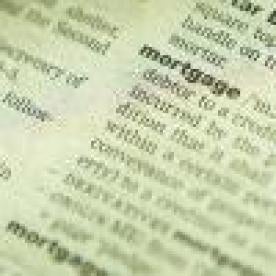Before and at the beginning of the economic downturn, residential foreclosures in Wisconsin typically followed a routine, often uncontested legal process. Since Wisconsin is a judicial foreclosure state (i.e., foreclosure is an equitable civil action commenced by a secured lender in circuit court), a foreclosing lender would initiate a foreclosure proceeding and a borrower would simply allow the legal process to run its course before the house was sold at a sheriff’s sale. Rather than contest the foreclosure, borrowers wishing to preserve homeownership were more likely to file bankruptcy. Even in a contested foreclosure case, a lender historically had little trouble prevailing on a motion for summary judgment. Indeed, the courts routinely granted summary judgment in favor of a lender if the lender submitted evidence that it held the underlying loan and the borrower was in default. Under the Wisconsin Rules of Evidence, the lender most often made this showing through an affidavit executed by one of its employees in compliance with Wisconsin’s “business records” exception to the hearsay rule, which states:
Records of regularly conducted activity. A memorandum, report, record, or data compilation, in any form, of acts, events, conditions, opinions, or diagnoses, made at or near the time by, or from information transmitted by, a person with knowledge, all in the course of a regularly conducted activity, as shown by the testimony of the custodian or other qualified witness, or by certification that complies with s. 909.02 (12) or (13), or a statute permitting certification, unless the sources of information or other circumstances indicate lack of trustworthiness.
Wis. Stat. § 908.03(6). Prior to 2010, lenders using the business records exception to provide evidence of ownership and default through affidavit rarely faced any meaningful objection from a borrower on summary judgment.
But that changed almost five years ago when the Wisconsin Court of Appeals decided Palisades Collection LLC v. Kalal, 2010 WI App 38, ¶ 9, 324 Wis. 2d 180, 781 N.W.2d 503. While the Palisades decision did not technically change the law, it certainly upended the long-established judicial foreclosure procedures in Wisconsin from the lender’s prospective. The court in Palisades considered an affidavit executed by an employee of a debt collector. This person had control over certain documents relating to the debt, which was held by another party. However, the affiant had no personal knowledge regarding how the documents were created and whether they were prepared in the ordinary course of the business of the party holding the debt. The affiant was not and never had been an employee of the party that held the debt. On these facts, the court of appeals concluded that the affiant lacked the personal knowledge required to meet the business records exception and reversed the trial court’s grant of summary judgment.
While the Palisades decision is ultimately a narrow one, borrowers have—successfully—latched onto it in an effort to force lenders’ strict compliance with the business records exception. Indeed, over the last five years, borrowers’ reliance on Palisades has led to a number of decisions denying a lender’s right to foreclose on summary judgment. However, many of these cases would have been granted on summary judgment if the lender submitted an affidavit that complied with the business records exception. As such, it is important for lenders to implement practices compliant with Palisades and its progeny. Fortunately, Palisades and subsequent cases provide a helpful roadmap for lenders to follow to avoid these evidentiary pitfalls.
Palisades teaches that before filing for foreclosure, a lender should consider whether it can locate a person with personal knowledge of (1) how the relevant loan documents were created, and (2) that such documents were created in the course of a regularly conducted business activity. The person need not actually have been present when the documents were created. The person also need not explain in detail the procedure used to create the documents, the precise location of their creation, or who actually created them. However, the affiant must have—at a minimum—personal knowledge of how the institution maintains the documents and manages the information used to create the business records. Without this threshold personal knowledge, the affiant’s testimony runs the risk of being excluded.
Once a qualified affiant is located, she should sign an affidavit that provides detail about her job duties and training. Ideally, the affiant would testify regarding her training and experience with the lender’s document and mortgage loan management procedures and (if applicable) loan/payment management software and computer systems. With that foundation laid, the affiant can properly state that she has personal knowledge of the manner in which the borrower’s payments are received, processed, entered into the lender’s system, and ultimately used to generate a payment/loan history evidencing default. See Bank of Am. v. Neis, 2013 WI App 89, ¶¶ 24-32, 349 Wis. 2d 461, 835 N.W.2d 527. The facts stated in the affidavit can be general, but the affiant must still demonstrate personal knowledge of the general facts. To that end, the affiant does not need to be the person that created the document or entered the information used to create the document into the bank’s system. Rather, she need only demonstrate the personal knowledge of the procedures used to create the relevant loan documents. As the consequences of an insufficient affidavit can be significant, it is best to err on the side of providing as much information as possible to meet the personal knowledge requirement.
Many of the cases relying on Palisades also teach what is insufficient to meet the business records exception. For starters, a lender should not rely on an affidavit that simply repurposes and parrots the language of the business records exception. Moreover, the court of appeals has held that an affiant cannot properly authenticate documents simply by virtue of her role as a “business analyst” or “records custodian” of the lender.
An affiant may not, likewise, automatically satisfy the business records exception where the loan documents were created by a prior lender. In such an instance, the current lender should do what it can to obtain testimony from the entity that held the loan at the time of default. Alternatively, the current lender may seek to enter the evidence through its own affiant provided the affiant can testify regarding the transfer of the debt from the original lender. See Cent. Prairie Fin. LLC v. Yang, 2013 WI App 82, ¶ 10, 348 Wis. 2d 583, 833 N.W.2d 866. Specifically, the court of appeals has noted that an affiant may authenticate records created by a prior lender if he or she can demonstrate familiarity with the former lender’s creation and maintenance of the documents. Id. Any additional information regarding the current lender’s practices and procedures for acquiring debt from third parties may also be helpful, provided the affiant can discuss the integration of the former lender’s records with its own. Id. In such instances, the current lender’s affiant may be able to authenticate documents created by the original entity.
In summary, while Palisades is a narrow decision, it teaches that lenders should locate a qualified witness early in the lawsuit and ensure strict compliance with the business records exception when drafting an affidavit. In the event that a proper witness cannot be located, the lender must consider alternative ways to properly admit relevant loan documents into evidence. When necessary, a full review of such potential alternatives should be considered early in any foreclosure or other enforcement proceeding.





 i
i


